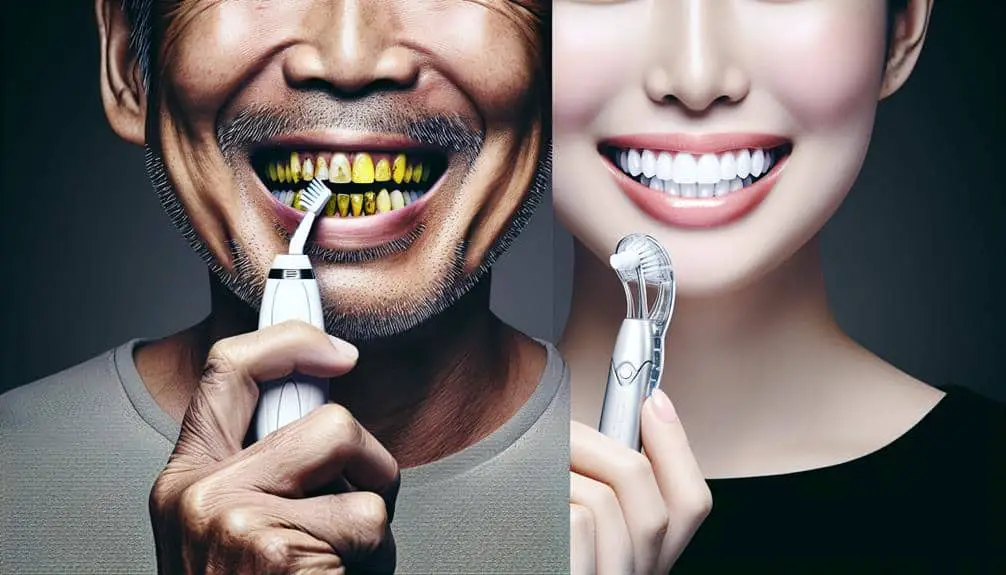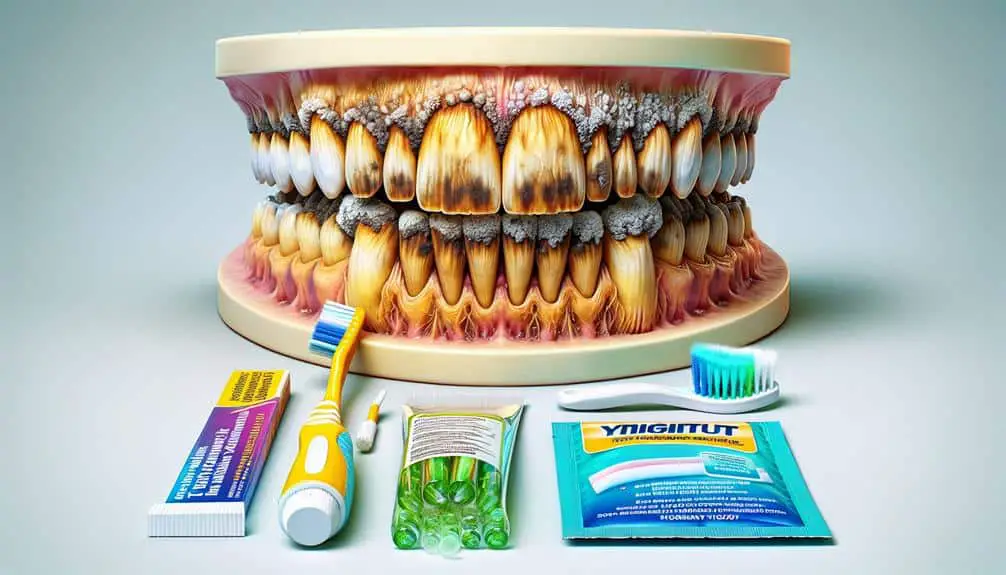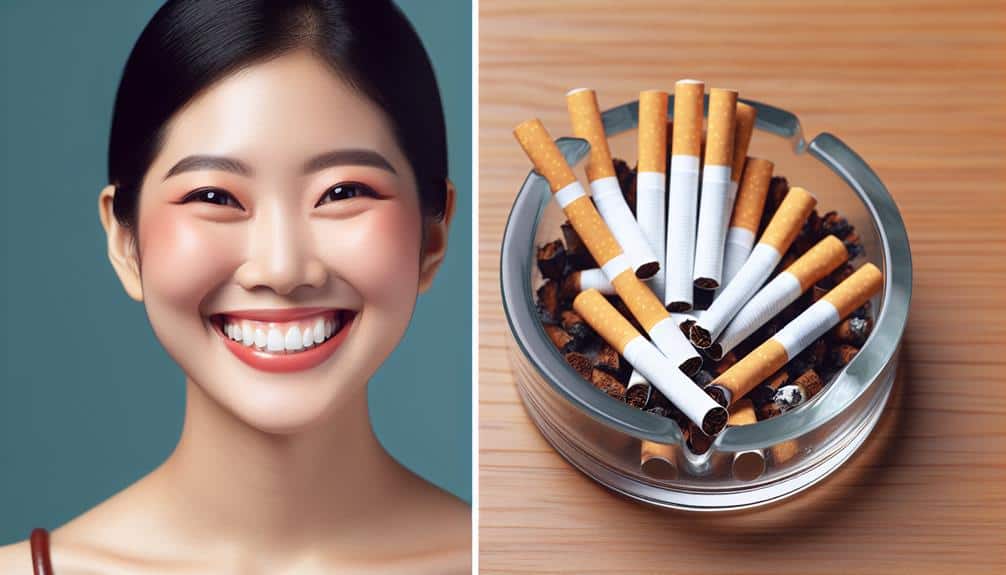Looking to brighten your teeth despite smoking? Start by reducing smoking frequency to lessen discoloration. Choose whitening products designed for smokers and opt for gentle brushing with circular motions. Avoid stain-causing foods and drinks like dark beverages and acidic foods. Consider professional whitening treatments for stronger results but remember to maintain consistent oral hygiene habits. Utilizing natural remedies like oil pulling or baking soda can also enhance your smile. These tips pave the way for a whiter smile and healthier teeth.
Key Points
- Reduce smoking frequency to limit teeth discoloration.
- Choose whitening products designed for smokers.
- Maintain consistent oral hygiene routine for brighter teeth.
- Consider professional whitening treatments for faster results.
- Avoid stain-causing foods and drinks to preserve whitened teeth.
Understanding Smokers Teeth Discoloration
To understand smokers' teeth discoloration, it's vital to grasp the impact of tobacco on dental enamel and overall oral health. The primary cause of teeth discoloration in smokers is the tar and nicotine present in cigarettes. These substances can lead to yellow or brown stains on the teeth, affecting not only their appearance but also their health. The porous nature of enamel allows these chemicals to penetrate and settle, making it challenging to remove through regular brushing alone.
Thankfully, there are solutions for discoloration caused by smoking. Professional teeth whitening treatments offered by dentists can help eliminate stubborn stains and restore the natural whiteness of teeth. Additionally, using whitening toothpaste and mouthwashes specifically designed to combat discoloration can aid in improving the appearance of smoker's teeth.
Moreover, the impact of smoking on oral health extends beyond just discoloration. It can lead to gum disease, bad breath, and an increased risk of oral cancer. Hence, quitting smoking isn't only beneficial for the appearance of your teeth but also essential for maintaining overall oral health.
Importance of Dental Check-Ups
Regular dental check-ups are crucial in maintaining good oral health. These exams allow your dentist to pinpoint any issues early on, preventing them from escalating into more serious problems.
Regular Dental Exams
Scheduling regular dental check-ups is essential for maintaining the health and appearance of your teeth, especially for smokers looking to whiten their smile. These check-ups involve more than just cleanings; they play a critical role in monitoring your oral health.
During these visits, your dentist can detect early signs of dental issues and provide necessary interventions, preventing potential complications. Regular examinations allow for the timely removal of plaque and tartar buildup, reducing the risk of gum disease and tooth decay.
Additionally, dentists can offer personalized advice on oral hygiene practices and recommend treatments to improve your dental health. By prioritizing regular dental exams, you're taking proactive steps to guarantee a healthy and bright smile.
Preventive Care Measures
For smokers aiming to enhance the whiteness of their teeth, prioritizing preventive care measures such as regular dental check-ups is vital. Lifestyle changes, including quitting smoking and adopting healthy habits, play an important role in maintaining oral hygiene.
Dental check-ups allow for early detection of any potential issues, preventing them from worsening and leading to more severe problems down the line. During these check-ups, your dentist can provide personalized advice on how to improve your oral care routine, recommend suitable whitening treatments, and address any concerns you may have.
Early Problem Detection
Detecting dental problems early through regular dental check-ups is essential for maintaining excellent oral health and addressing issues promptly. Early prevention is vital to preventing minor concerns from escalating into more complex and costly problems.
By attending routine dental appointments, your dentist can identify issues such as gum disease, cavities, or early signs of oral cancer before they worsen. Lifestyle changes, like quitting smoking and adopting a thorough oral hygiene routine, can also contribute to early problem detection.
These check-ups not only help in maintaining a bright smile but also play an important role in your overall well-being. Remember, prevention is always better than cure, so prioritize your dental health with regular visits to the dentist.
Limiting Smoking for Better Results
To achieve better results in whitening your teeth as a smoker, reducing the frequency and amount of smoking is crucial. Smoking not only stains your teeth but also hinders the effectiveness of whitening treatments. Decreasing cravings and ultimately quitting smoking altogether can greatly enhance the outcome of your whitening efforts.
One way to limit smoking is by identifying triggers that make you reach for a cigarette. By recognizing these triggers, you can find alternative ways to cope with them without smoking. This could involve activities like taking a walk, chewing sugar-free gum, or practicing deep breathing exercises. Additionally, gradually reducing the number of cigarettes smoked per day can help lessen the impact on your teeth while working towards quitting.
Choosing the Right Whitening Products
Selecting the appropriate whitening products can greatly impact the effectiveness of your teeth whitening efforts as a smoker. When choosing whitening products, take into account factors such as product effectiveness and safety. Search for products that are specifically designed for smokers to target tough stains effectively. It's vital to opt for products that not only whiten but also safeguard your enamel and sensitive gums. Reading reviews from other smokers who've used the products can offer valuable insight into their effectiveness.
Cost comparison is another vital aspect to ponder when selecting whitening products. While some products may be more expensive, they may provide better results or additional benefits such as enamel protection. However, there are also budget-friendly options that can still deliver satisfactory results. It's important to strike a balance between cost and quality when making your selection.
Brushing and Flossing Techniques
For effective teeth whitening as a smoker, mastering proper brushing and flossing techniques is vital to achieving best results. When it comes to brushing, make sure you're using the correct technique. Angle your brush at 45 degrees towards the gum line and make gentle circular motions. Brush all surfaces of your teeth, including the front, back, and chewing surfaces. Remember to brush for at least two minutes to effectively remove plaque and stains.
In addition to brushing, flossing is essential for smokers looking to whiten their teeth. Use the proper flossing technique by gently guiding the floss between your teeth and curving it around each tooth in a C shape to reach below the gum line. This helps remove plaque and debris that brushing alone may miss. Effective tools such as electric toothbrushes and water flossers can also aid in achieving a thorough clean.
Avoiding Stain-Causing Foods and Drinks
To maintain the whiteness of your teeth, it's important to be mindful of the foods and drinks you consume. Certain foods like berries, tomato sauce, and soy sauce can stain your teeth over time.
Opting for lighter colored beverages like water, milk, and clear sodas can help prevent staining and keep your teeth looking brighter.
Food to Avoid
To prevent further staining on your teeth, it's important to be mindful of the foods and drinks you consume daily. Here are three key items you should avoid to maintain a whiter smile:
- Dark Colored Beverages: Drinks like coffee, tea, and red wine can all contribute to teeth staining.
- Acidic Foods: Citrus fruits and acidic sauces can erode enamel, making teeth more susceptible to staining.
- Sugary Snacks: Candies, sodas, and other sugary treats can feed bacteria in your mouth, leading to discoloration and decay.
Drink Choices
Choosing beverages that are less likely to stain your teeth can greatly help in maintaining a brighter smile. Opt for healthy hydration choices like water, which not only keeps you hydrated but also helps in preventing staining.
Tea and coffee are common choices for many, but bear in mind that while both can impact whitening efforts, coffee tends to be more staining due to its darker pigments. Tea, especially green tea, contains polyphenols that can actually benefit your teeth by reducing bacteria and helping to prevent plaque buildup.
If you enjoy tea or coffee, consider drinking through a straw to minimize contact with your teeth. Making thoughtful drink choices can positively impact your whitening journey.
Impact on Teeth
Have you ever wondered how certain foods and drinks can impact the staining of your teeth? The impact of stain-causing foods and drinks on your teeth can be significant. Here are a few key points to take into account:
- Acidic Foods: Foods high in acidity can erode the enamel of your teeth, making them more prone to staining.
- Dark-Colored Beverages: Drinks like coffee, tea, and red wine contain chromogens that can adhere to your teeth and cause discoloration.
- Sugary Snacks: Sugary treats can lead to the growth of bacteria in your mouth, which can contribute to the yellowing of your teeth.
Being mindful of these factors and opting for treatment options like professional whitening procedures or at-home whitening kits can help combat the effects of stain-causing foods and drinks.
Professional Whitening Treatments
For optimal outcomes, professional whitening treatments are recommended to effectively brighten smokers' teeth. Dentist suggestions often include in-office procedures that utilize stronger whitening agents than those found in at-home options. These treatments are more potent and can deliver quicker results, making them a preferred choice for individuals seeking significant improvement in tooth color.
When contemplating professional whitening treatments, it's crucial to factor in cost considerations. In-office procedures tend to be more expensive than at-home options due to the higher concentration of whitening agents used and the expertise of the dental professionals administering the treatment. However, the investment may be worthwhile for those looking for fast and noticeable results.
Treatment duration can vary depending on the method chosen and the extent of discoloration. In-office treatments typically require one or more sessions, each lasting around an hour. On the other hand, at-home options may involve wearing custom trays filled with whitening gel for a specified period each day over several weeks to achieve the desired outcome.
Developing a Consistent Oral Hygiene Routine
To maintain a bright smile, start by brushing your teeth twice daily and make sure to floss before bedtime.
Consistency is key when it comes to oral hygiene routines, so establish a habit that works for you and stick to it.
Brushing Twice Daily
Develop a consistent oral hygiene routine by making it a habit to brush your teeth twice daily using a fluoride toothpaste. Brushing your teeth regularly is essential for maintaining oral health and achieving a brighter smile. Here are a few essential tips to enhance the effectiveness of your brushing routine:
- Choose the Right Whitening Toothpaste: Opt for a whitening toothpaste that's proven to be effective in removing surface stains and brightening your teeth.
- Master Proper Brushing Technique: Use gentle circular motions to brush all surfaces of your teeth thoroughly, ensuring you reach every corner of your mouth.
- Establish Good Brushing Habits: Set a routine by brushing your teeth at least twice a day, preferably in the morning and before bed, to remove plaque buildup and prevent staining.
Flossing Before Bedtime
Begin your oral hygiene routine by incorporating flossing before bedtime to guarantee thorough cleaning between teeth and along the gumline. Proper technique is essential for effective flossing.
Start by taking about 18 inches of floss and winding most of it around one of your middle fingers. Hold a small section taut between your thumbs and forefingers and gently guide it between each tooth in a back-and-forth motion. Curve the floss around the base of each tooth to make sure you reach below the gumline.
The benefits of flossing before bed are immense. It helps remove plaque and food particles that your toothbrush might miss, reducing the risk of cavities and gum disease. Make flossing a non-negotiable part of your nighttime routine for a healthier smile.
Using Natural Remedies for Whitening
Think about incorporating natural remedies into your dental routine to help whiten your teeth effectively. These remedies can be a safe and efficient way to enhance the brightness of your smile without harsh chemicals.
Here are three natural options to think about:
- Herbal Remedies: Certain herbs like sage, basil, or neem have been traditionally used for their teeth-whitening properties. These herbs contain natural compounds that can help remove surface stains and promote a brighter smile. Herbal remedies are known for their effectiveness in gently whitening teeth over time.
- Oil Pulling: This ancient technique involves swishing oil around in your mouth to remove bacteria, which can lead to whiter teeth. Coconut oil is a popular choice for oil pulling due to its antimicrobial properties. Regular oil pulling can help maintain oral hygiene and contribute to a brighter smile safely.
- Baking Soda: Mixing baking soda with a small amount of water to form a paste can act as a natural toothpaste. Baking soda is mildly abrasive and can help scrub away stains on the teeth's surface gently. Its natural ingredients make it a safe option for whitening your teeth at home.
Maintaining Results With Follow-Up Care
To maintain the results of your teeth whitening efforts, consistently follow a tailored oral care routine that focuses on preserving the brightness of your smile. After undergoing teeth whitening, it's important to engage in proper follow-up maintenance to guarantee long-term care for your newly brightened smile. Implementing a diligent oral hygiene routine is essential for maintaining the results achieved through the whitening process.
To uphold the whiteness of your teeth, continue to brush at least twice a day with a whitening toothpaste. Additionally, floss daily to remove any plaque or staining between your teeth. Regular dental check-ups every six months are critical for professional cleaning and monitoring the health of your teeth and gums. It's also advisable to avoid tobacco products and limit foods and drinks that can stain your teeth, such as coffee, tea, and red wine.
Frequently Asked Questions
Can Smoking Cessation Alone Reverse Teeth Discoloration Caused by Smoking?
Quitting smoking can help halt further teeth discoloration, but it may not reverse existing stains completely. Consider cosmetic dentistry procedures in conjunction with smoking cessation for best teeth whitening results. Make informed choices for a brighter smile.
Are There Any Specific Whitening Products That Are Designed Specifically for Smokers?
For smokers looking to whiten their teeth, there are specialized whitening toothpaste and strips available. Additionally, professional treatments like laser whitening can be effective. Home remedies such as baking soda and hydrogen peroxide may also help.
How Often Should I Visit the Dentist for Check-Ups if I Am a Smoker Trying to Whiten My Teeth?
For maximum oral health while whitening teeth as a smoker, visit the dentist every six months. These check-ups help monitor your progress, detect issues early, and provide guidance on smoking cessation benefits for improved results.
Are There Any Long-Term Effects on Oral Health From Smoking That May Impact Teeth Whitening Results?
Long-term effects of smoking, like the impact of nicotine on oral health, can hinder teeth whitening results. Consistent dental hygiene habits are essential to counteract these effects and maintain a brighter smile over time.
Can Natural Remedies for Teeth Whitening Be Harmful to Oral Health in the Long Run?
Using natural remedies for teeth whitening can have risks to oral health. Some remedies like acidic fruits or baking soda may erode enamel over time. It's important to prioritize safety and consult with a dentist for guidance.
Conclusion
To sum up, whitening smokers' teeth can be a challenging but achievable goal with the right approach. By incorporating regular dental check-ups, limiting smoking, and using the appropriate whitening products and techniques, you can see significant improvements in your smile.
Remember, maintaining results is like tending to a garden – it requires consistent care and attention. With dedication and proper oral hygiene, you can achieve a brighter, healthier smile.



